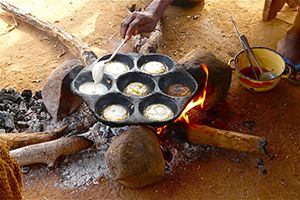Investing in Research – new evidence showing how a nutrition-sensitive agriculture program improves children’s nutritional status
Speakers
- Stella Nordhagen, Regional Monitoring and Evaluation Adviser in Africa, HKI (Presentation | Video)
- Deanna Olney, Senior Research Fellow, IFPRI (Video)
- Rolf Klemm, Vice President for Nutrition, HKI (Video)
Panelists
- Beth Dunford, Assistant to USAID Administrator & Deputy Coordinator for Feed the Future, USAID (Video)
- Victoria Quinn, Senior Vice President for Programs, HKI (Opening Remarks Video | Panelist Video)
- Amy Baker, Director General, Health and Nutrition Bureau, Global Affairs Canada (Video)
Moderator
- Marie Ruel, Division Director, Poverty, Health and Nutrition Division, IFPRI (Video)
- Q&A Video
Nutrition-sensitive agriculture programs can improve nutrition outcomes for young children, however documentation of the extent of their effectiveness has been limited. Recent evidence from Burkina Faso published by IFPRI and Helen Keller International (HKI), demonstrated the effectiveness of HKI’s nutrition-sensitive agriculture program for decreasing child anemia, wasting and diarrhea. Although the program was effective, larger and more diverse impacts on child nutrition were needed. Building on their collaboration, HKI and IFPRI worked together to redesign, implement and evaluate more comprehensive nutrition-sensitive agriculture program packages designed to further increase program effectiveness. The primary questions addressed in this second evaluation revolved around the additional benefit of including a water, sanitation and hygiene (WASH) intervention or a small-quantity-lipid-based nutrition supplement (SQ-LNS), or increasing the duration of community-level exposure to their effective nutrition-sensitive program.
This seminar will highlight programmatic insights and learning generated on the implementation of multisectoral nutrition-sensitive programs to improve children’s nutritional outcomes and will present key results from the latest impact evaluation. The invited commentators will share their views on the implications of the findings for future investments in nutrition-sensitive agriculture and discuss how this type of programming and evaluation work feeds into the larger development agenda for improving the nutrition of young children.


